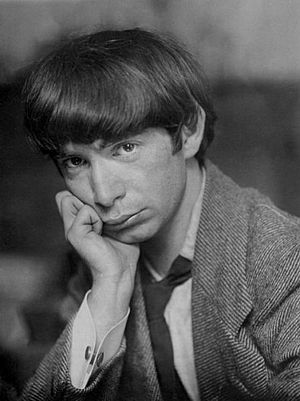Ossip Zadkine facts for kids
Quick facts for kids
Ossip Zadkine
|
|
|---|---|

Zadkine in 1914
|
|
| Born |
Yossel Aronovich Tsadkin
28 January 1888 |
| Died | 25 November 1967 (aged 79) Paris, France
|
| Resting place | Cimetière Montparnasse |
| Known for | Sculpture, painting, lithography |
| Movement | Cubism, Art Deco |
Ossip Zadkine (Russian: Осип Цадкин) was a famous artist. He was born on January 28, 1888, and passed away on November 25, 1967. He was born in Belarus but later became a French citizen. Zadkine is best known for his amazing sculptures. He also created paintings and lithographs (a type of printmaking).
Contents
Early Life and Learning
Ossip Zadkine was born as Yossel Aronovich Tsadkin in Vitsebsk. This city was part of the Russian Empire, which is now Belarus. His father was Jewish, and his mother, Zippa-Dvoyra, was said to be of Scottish background. Ossip had five brothers and sisters.
When he was fifteen, his father sent him to Sunderland in England. The goal was for him to learn English and good manners. Later, he moved to London. There, he took classes at the Regent Street Polytechnic. However, he found the teachers there to be too old-fashioned.
In 1910, Zadkine moved to Paris, France. He studied at the École des Beaux-Arts for about six months. In 1911, he lived and worked in a famous artists' residence called La Ruche. While in Paris, he joined the Cubist art movement. He worked in this style from 1914 to 1925. After that, he developed his own unique style. This style was greatly influenced by art from Africa and ancient Greece.
His Artistic Journey
Ossip Zadkine became a French citizen in 1921. During World War I, he served in the French Army. He was a stretcher-bearer, helping wounded soldiers. He was also injured during the war. During World War II, he lived in the United States.
One of his most famous artworks is a sculpture called The Destroyed City. He created it between 1951 and 1953. This powerful sculpture shows a man without a heart. It is a memorial to the city of Rotterdam in the Netherlands. The city center was heavily bombed in 1940 by the Nazi-German Luftwaffe.
Zadkine also taught sculpture classes. He taught at the Académie de la Grande Chaumière until 1958. Some of his students became well-known artists themselves.
Later Years and Legacy
Ossip Zadkine passed away in Paris in 1967. He was 79 years old. He was buried in the Cimetière du Montparnasse.
Zadkine Museums
His former home and art studio in Montparnasse, Paris, is now a museum. It is called the Musée Zadkine. After his wife, Valentine Prax, passed away, she gave the house and studio to the City of Paris. This allowed the museum to be created.
There is another Musée Zadkine in the village of Les Arques in France. Zadkine lived in Les Arques for several years. While there, he carved a huge Christ on the Cross and a Pieta. These artworks are now in the 12th-century church across from the museum.
Personal Life
In August 1920, Zadkine married Valentine Prax. She was a painter born in Algeria. They did not have any children together.
Zadkine was a friend and neighbor of the writer Henry Miller in Montparnasse. Miller even included a character based on Zadkine in his novel, Tropic of Cancer. Other artists like Chaim Soutine and Tsuguharu Foujita also lived nearby.
While he was living in New York City during World War II, Zadkine had a relationship with American artist Carol Janeway. He created several portraits of her. Zadkine had one child, a son named Nicolas Hasle, born in 1960.
Awards and Honors
Ossip Zadkine received several important awards for his art:
- 1950: Sculpture prize at the Venice Biennale
- 1961: Grand Prix National des Arts
Lasting Impact
A school in Rotterdam was named after Zadkine. As part of their training, they even have a program called Zadkine Airlines. This shows how much his work is still remembered and honored.
Images for kids
-
Bas-relief of the Blomme House in Brussels representing the architect's instruments
Where His Art Can Be Seen
Many public art collections display works by Ossip Zadkine. Some of these include:
- Van Abbemuseum, Eindhoven, Netherlands
- Museum de Fundatie, Zwolle, Netherlands
- Tel Aviv Museum of Art, Israel
- Musée Zadkine
See also
 In Spanish: Ossip Zadkine para niños
In Spanish: Ossip Zadkine para niños
 | Bayard Rustin |
 | Jeannette Carter |
 | Jeremiah A. Brown |










